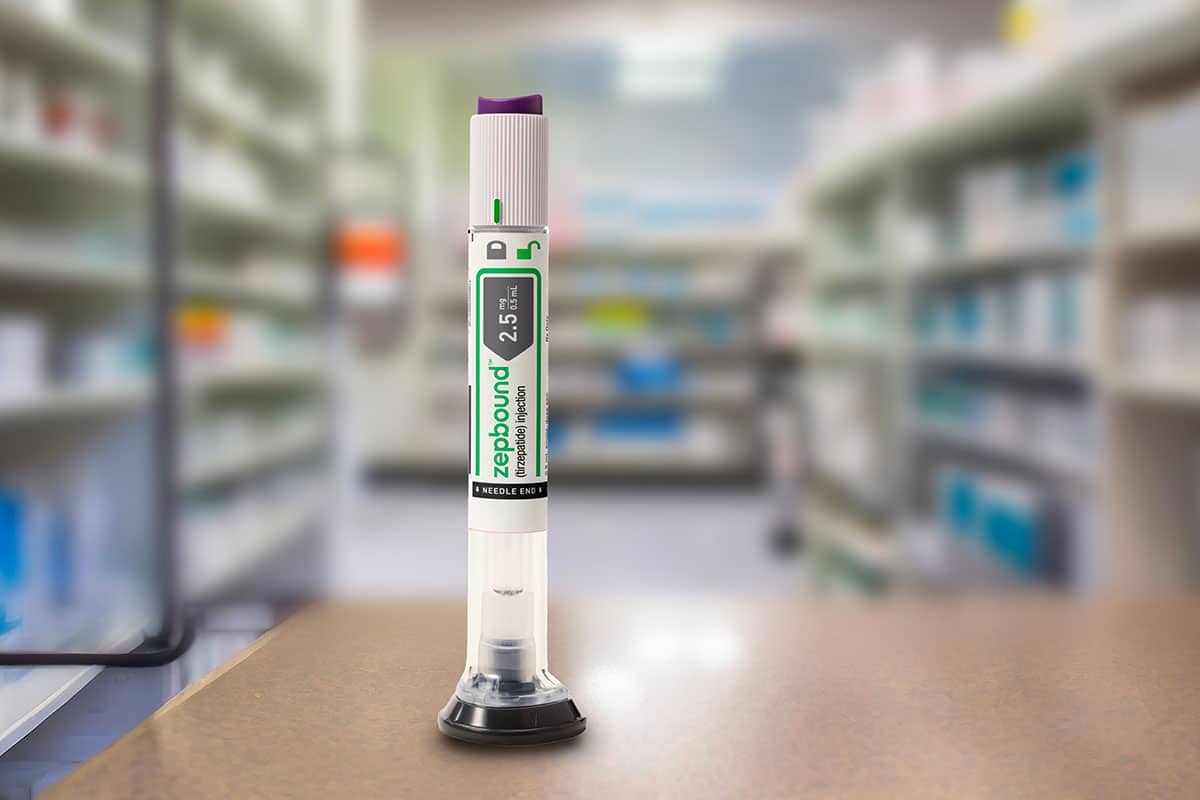It’s hard to miss the headlines and excitement – A newly FDA-approved weight loss drug may work better than any of the drugs we have on the market and some claim it is “chemical” bariatric surgery because weight loss results are as powerful and bypass the operating room.
What is Zepbound®?
In early November, the US Food and Drug Administration (FDA) approved Zepbound® to treat chronic obesity. Zepbound® is a once weekly injection made by the pharmaceutical company Eli Lilly. The active ingredient in Zepbound® is Tirzepatide, which had already been approved in May 2022 under the name Mounjaro for treatment of Type 2 diabetes. Tirzepatide is a dual incretin agonist, meaning it actives gut hormones in response to food and helps regulate appetite and satiety among other benefits. Zepbound® joins the market as a competitor to Wegovy, manufactured by Novo Nordisk, whose active ingredient is semaglutide, and was FDA approved for chronic obesity in 2021.
What is the difference between Zepbound® and Wegovy?
Both medications are FDA approved for chronic obesity, they are once weekly injections and clinical trials support they cause significant weight loss. Their active ingredients differ. Wegovy’s is semaglutide and Zepbound’s is tirzepatide. Both are categorized as GLP-1 agonists. GLP-1, or glucagon-like peptide 1, is a hormone released by our gut in response to food.
Zepbound® is a dual agonist. It acts both on GLP-1 and GIP. The active ingredient is Tirzepatide
GLP-1 helps regulate blood glucose levels, suppresses appetite and helps us feel full. Wegovy acts solely on GLP-1. Zepbound® acts on GLP-1 plus another gut hormone called gastric inhibitory polypeptide (GIP) which has similar effects to GLP-1. This is why Zepbound® is considered a “dual” agonist, it acts both on GLP-1 and GIP.
What kind of weight loss results can be expected?
Both Wegovy and Zepbound® work well. Study results on semaglutide (Wegovy) published in the New England Journal of Medicine 2021 showed that while on the medication, people lost an average of 15% of body weight in one year, compared with 2.4% on placebo. Studies on tirzepatide (Zepbound®) also showed excellent results. Weight reduction was of 16% (or 35 pounds) in a year on those taking the lower dose of tirzepatide compared with placebo. Those in the higher dose group showed a 21.4% (or 49 pound) weight reduction in about a year.
Studies comparing these medications head-to-head were not performed so we cannot conclude that one works better than the other. The importance here is having more available tools in our box to treat obesity safely and successfully for the long run. Importantly, we need to remember that treatment is individualized. Some people may tolerate Wegovy better than Zepbound® or vice versa.
How long do these medications need to be taken?
Obesity is a chronic, complex and relapsing disease and should be treated as such. For the minority, diet and exercise is sufficient to contain and reverse excess weight. But for the vast majority, medical intervention is needed, to reverse the physical, mechanical and mental burden of the disease. If the medication is stopped, studies show the weight comes back on. These are potent agents that should not be used lightly.
Proper supervision, dosing, and monitoring is a must. Not everybody is a candidate, nor should be. In a way, this is no different that treatment for other chronic diseases such as high cholesterol and high blood pressure.
Additionally, both medications should be used in the context of dietary and lifestyle changes that include portion sizes, less junk food, more movement, better sleep and less stress because of the weight promoting environment we all live in.
What side effects can be expected when taking GLP-1 drugs?
The most common side effects are related to the gut: nausea, diarrhea, vomiting and constipation. In a minority of cases, there has been associated inflammation of the pancreas and gallbladder. When used under proper medical supervision, nutrition counseling prioritizing hydration and protein, these medications can be life changing. Like with any medication, long-term side effects are not known. But if you consider that Obesity is the second leading cause of preventable death in the US, and associated with over 200 medical conditions including 13 types of cancer the risk benefit ratio changes wouldn’t you say?
Cost and coverage seem to be a recurrent theme with these medications. Should people consider more affordable versions? Or compounding kinds?
Unfortunately, the cost, coverage and availability is out of the control of providers. The safest thing is to use medications that are directly made by the manufacturers, Eli Lilly and Novo Nordisk. The FDA allows compounding under certain circumstances, including times of drug shortage. But, unlike the manufactured versions, compounded medications are not inspected for quality, safety nor effectiveness which means there is higher risk involved.
Access to care, coverage and affordability continues to be a limitation for the treatment of obesity. Evexia Medical’s director, Dr. Florencia Ziemke is a founding member of the Florida Obesity Society, recently established to help bring advocacy, education and support. She was also involved in updating rules in the state restricting access to care for those affected by obesity. There is a lot of work to be done and a curvy road ahead, but positive changes are coming as we see new tools added to the therapeutic armamentarium. Individuals should discuss this with their healthcare providers, discuss alternatives such as other weight loss agents or use of medical grade meal replacements such as Optifast and know that regardless of the amount of weight loss seen in studies, both medications are an adjunct to dietary changes and lifestyle behavior.





